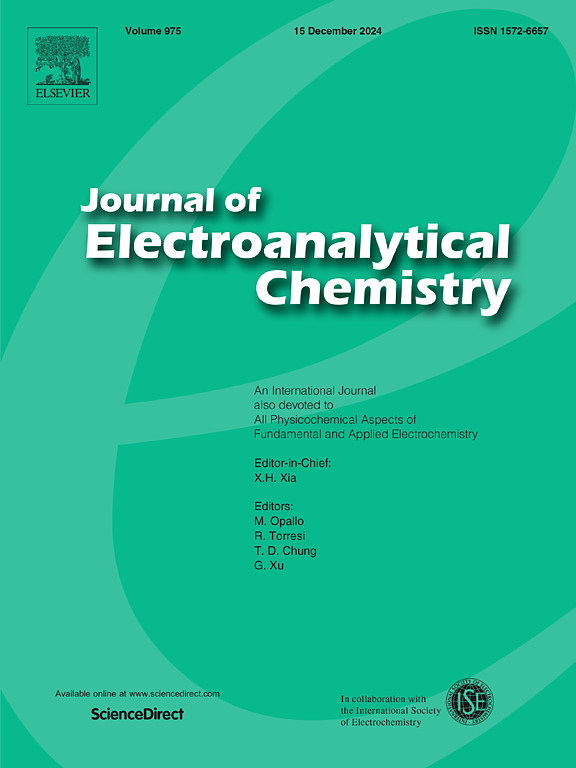用于超级电容器的掺镉钒酸铜电极的电化学性能和循环稳定性增强
IF 4.1
3区 化学
Q1 CHEMISTRY, ANALYTICAL
引用次数: 0
摘要
超级电容器具有功率密度高、充放电速度快、循环寿命长等优点,是一种很有前途的储能器件。然而,钒酸铜电极的循环稳定性不高,限制了其实际应用。在这项工作中,通过一种具有成本效益的共沉淀法合成了镉掺杂的钒酸铜纳米结构,其中镉含量不同(1%,3%,5%和7%)。结构和形态研究证实了镉的成功掺入,镉改变了晶体尺寸、晶格应变和表面特征。电化学分析(CV, GCD和EIS)表明,掺杂镉显著提高了电荷存储和电荷转移动力学。在所有样品中,掺5% cd的电极在5 mV/s下具有最高的576 F/g比电容和优异的稳定性,在3000次循环后保持率为92.2%。这些发现强调了镉掺杂是一种有效的策略,可以改善钒酸铜电极的假电容行为和长期性能,使其成为下一代超级电容器应用的有吸引力的候选者。本文章由计算机程序翻译,如有差异,请以英文原文为准。
Enhanced electrochemical performance and cycling stability of cadmium-doped copper vanadate electrodes for supercapacitor applications
Supercapacitors are promising energy storage devices owing to their high power density, rapid charge–discharge capability, and long cycle life. However, the moderate cycling stability of copper vanadate electrodes limits their practical application. In this work, cadmium-doped copper vanadate nanostructures are synthesized via a cost-effective co-precipitation method with varying Cd contents (1 %, 3 %, 5 %, and 7 %). Structural and morphological studies confirm the successful incorporation of Cd, which modifies the crystallite size, lattice strain, and surface features. Electrochemical analyses (CV, GCD, and EIS) demonstrate that Cd doping significantly enhances charge storage and charge transfer kinetics. Among all samples, the 5 % Cd-doped electrode exhibits the highest specific capacitance of 576 F/g at 5 mV/s and superior stability with 92.2 % retention after 3000 cycles. These findings highlight cadmium doping as an effective strategy to improve the pseudocapacitive behavior and long-term performance of copper vanadate electrodes, making them attractive candidates for next-generation supercapacitor applications.
求助全文
通过发布文献求助,成功后即可免费获取论文全文。
去求助
来源期刊
CiteScore
7.80
自引率
6.70%
发文量
912
审稿时长
2.4 months
期刊介绍:
The Journal of Electroanalytical Chemistry is the foremost international journal devoted to the interdisciplinary subject of electrochemistry in all its aspects, theoretical as well as applied.
Electrochemistry is a wide ranging area that is in a state of continuous evolution. Rather than compiling a long list of topics covered by the Journal, the editors would like to draw particular attention to the key issues of novelty, topicality and quality. Papers should present new and interesting electrochemical science in a way that is accessible to the reader. The presentation and discussion should be at a level that is consistent with the international status of the Journal. Reports describing the application of well-established techniques to problems that are essentially technical will not be accepted. Similarly, papers that report observations but fail to provide adequate interpretation will be rejected by the Editors. Papers dealing with technical electrochemistry should be submitted to other specialist journals unless the authors can show that their work provides substantially new insights into electrochemical processes.

 求助内容:
求助内容: 应助结果提醒方式:
应助结果提醒方式:


